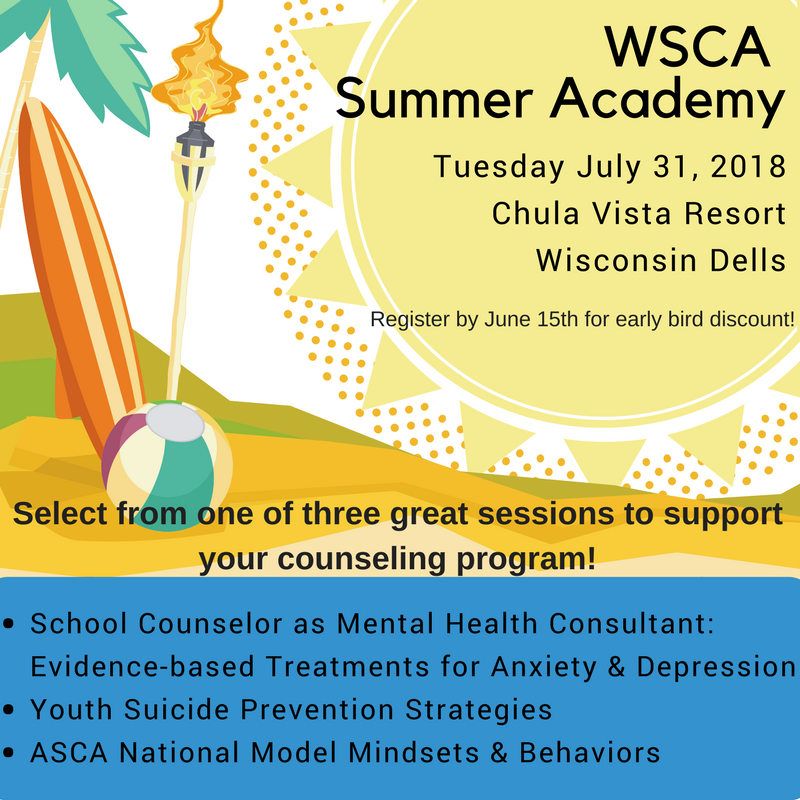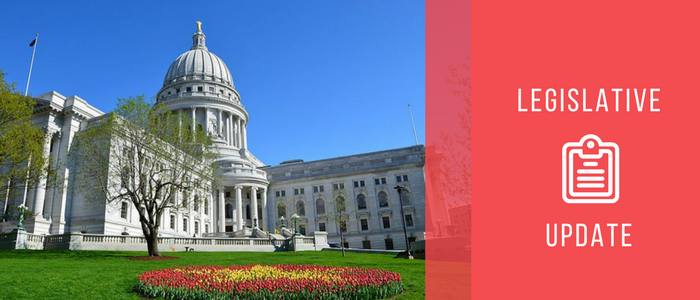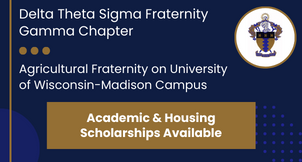May 2018

In This Issue:
Executive Director Message
Assistant Board Chair Message
Preparing to Review Your Program’s Effectiveness
Summer Academy
Legislative Update
WiRSA Update
Counselink
Staff Spotlight
Upcoming Events and Committee Updates
A Message from
Your Executive Director Stacy Eslick
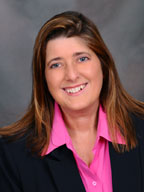
Reflecting as the school year comes to an end and planning for next year
WSCA had an amazing year thanks to our members and countless volunteers. Our Coordinator team has worked tirelessly to provide our members with professional development, newsletters, professional recognition, advocacy and school counselor representation at the state level.
While we continue to provide our members with benefits that have become familiar with over many years, WSCA is also expanding our partnerships, advocacy, and professional development. Your feedback and input are invaluable to ensuring we meet the needs of our membership!
WSCA is now actively promoting and encouraging the use of the ASCA model for all school counselors in the state. With this shift, WSCA leaders are continuing to hold our association accountable to members by developing annual comprehensive program goals, action plans, and SMART goals. We spent time in April working on the WSCA vision and mission with plans to begin longer-term strategic planning. We look forward to sharing more information with you on this project over the next year.
The WSCA team is looking forward to having you join us at Summer Academy in Wisconsin Dells! As always, please feel free to reach out to the WSCA team if you need further information or have questions.
Stacy
A Message from Your Assistant Board Chair,
Angela Goebel
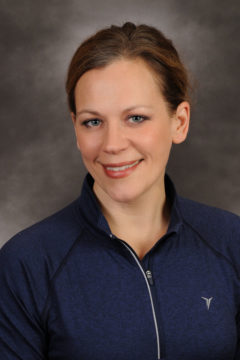
With the weather finally allowing us to enjoy the sun and get outside, it’s time to ‘feel most alive’. Get up…and Get Outside…if you can! Breathe in the air and take in the nature. It is a natural healer.
Naturally, we spend the year focusing on the needs of our students. We advocate for them. We support them. We help give them a voice to support themselves. We support those students who have mental health challenges and those students who have family members that struggle with mental health challenges. And sometimes, we do it without even thinking about our own mental well being. We just do.
May is Mental Health Month and has been for 69 years. Mental wellbeing along with emotional and physical wellbeing are so important to our overall health. As we move towards the end of another school year… or maybe it’s your first year as a school counselor… take care of your mental health. Whatever it is that helps you stay balanced, access those strategies and coping skills to finish strong. Continue to advocate for and support your students. But don’t forget to take care of your own wellbeing in order to best support those around you.
Our students need us but in order for us to support them, we need our mental health to be balanced. With the final stretch of the school year upon us… “May, more than any other month of the year, wants us to feel most alive.” – F.Hudson
Preparing to Review Your Program’s Effectiveness
By Alissa Darin, Board Director
School Counselor, Kettle Moraine School District
The countdown is on and the end of the school year is approaching. As busy as it gets, this is a great time to reflect upon your program’s effectiveness. This can be accomplished through a year-end program audit that uses data to evaluate the positive impact made on students as a result of your School Counseling program.
Why is using data important?
Data is important to School Counselors, as it is used to inform our practice. It helps us, and our teams, to trim the excess activities and make the most of our valuable time and resources to maximize our effectiveness. Data can also enable School Counselors to close achievement gaps and align to culturally competent practices. If you are committed to the ASCA National Model Implementation, using data as a part of your program is a key component of the ASCA School Counselor competencies.
Types of Data to Gather
When analyzing a program’s successes and growth areas, it’s important to consider evidence from multiple sources. By utilizing the three main types of data (process, perception, and outcome), you can develop a clearer picture of your program’s effectiveness.
- Process data refers to the whos, whats, and whens – for example, who attended an event, what lessons were taught, or how many sessions were held. It provides the first layer of information about a program: who you reached and what topics you covered.
- Tip: This is a GREAT PLACE TO START! Compile all of the program delivery that occurred over the last year. Use the ASCA “Results Reports” templates to review your School Counseling curriculum and small group results.
- Perception data goes a little deeper. It refers to evidence of people’s feelings about a program or impressions of how an intervention affected them. It also reflects the skills, knowledge or attitudes that a student has as a result of the activity or lesson. Gathering this data may take the form of a pre/post survey or a needs assessment.
- Tip: Organize parent and student feedback surveys from events, classroom curriculum and individual/group conferencing.
- Tip: Consider creating a perception survey for the staff in your building about important initiatives such as Social-Emotional Learning or ACPs. This can assess staff support of your program, which can be helpful when building future staff engagement.
- Outcome data is less subjective than perception data; it refers to achievement, attendance, and behavior. It shows the impact that your program has had on students’ overall academic success at school. Outcome data examples include attendance reports, graduation rates, and grade reports.
- Tip: Annually, set a program goal using the ASCA SMART Goal Worksheet. This will link your School Counseling program to the mission of the school in the areas of achievement, attendance and behavior.
- Tip: The National Clearinghouse provides statistics on districts’ graduate enrollment and completion of post-secondary programs. This information can play a vital role in determining how you align your yearly action plan to ACP outcomes.
- Tip: Achievement gaps in your outcome data can provide the basis for your SPO or PPG for your Educator Effectiveness cycle.
Getting Started
- Find the data you already have.
- Make a plan for the data you would like to collect going forward. Consider setting the foundation of your program by completing the School Data profile template. This will help you discern the major trends in your school and create program priorities that address student needs.
- Review your data to identify the ASCA Mindsets and Behaviors that will guide your program content.
Once you have your data compiled, decide who you will share the data with. A useful tool as you plan to share data with stakeholders is the “School Counseling Program Data Report” (Making Data Work, Third Edition, pg 80). Lastly, one more great “to do” for an end-of-the-year program evaluation is a “Use of Time Assessment” (ASCA template). Completing the “Use of Time Assessment” for several days or a week can help your team understand whether direct services, indirect services, program management or other school tasks are occupying the day.
The process of collecting and examining your program’s data may have a learning curve…but don’t get discouraged. The toughest step is to BEGIN. Soon thereafter, this will become a “must-have” component of your end-of-the-year activities!
ASCA Position Statement on Annual Performance Evaluations
Funding Opportunities for School Safety, Mental Health, Trauma, and Suicide Prevention
Wisconsin Department of Justice School Safety Grants
Attorney General Brad Schimel has established the Office of School Safety and hired an interim director. While the formal grant application process is finalized and announced next week, schools interested in applying for grant funding can submit a letter of interest to DOJ at schoolsafety@doj.state.wi.us.
The letters should include the following information:
• A single point of contact for the school, and contact information
• The type of school safety project to be implemented
• The name of the law enforcement agency which will be reviewing the project
• An approximate dollar amount of the grant request
• Whether the project could be in place for the 2018-19 school year
• When the fully developed application would be available for submittal
School-Based Mental Health Services Grant Program
The most recent governor’s budget provides funding, beginning in the fiscal year 2019, to create a new mental health grant program (Wis. Stat. sec. 115.367). The Department of Public Instruction will award grants to school districts, and operators of independent charter schools, to be used for the purpose of providing mental health services to pupils, in collaboration with community health agencies. Strategies may include co-locating community mental health clinics in schools and providing screening and intervention services. School boards and independent charter schools may apply for a grant individually or as a consortium of school boards, charter schools, or both; also, Cooperative Educational Service Agencies (CESAs) can be considered a consortium of school boards.
For application information and guidance, along with grant writing workshop registration, visit https://dpi.wi.gov/sspw/mental-health/school-based-grant-program.
Every Student Succeeds Act: Student Support and Academic Enrichment Grant
Title IV, Part A of the Every Student Succeeds Act (ESSA) is a newly enacted grant for 2017-2018, known as the Student Support and Academic Enrichment (SSAE) Grant. Title IV-A is a flexible block grant that authorizes financial support to districts and gives them significant flexibility in using funds to support the following three broad, priority areas:
• access to a well-rounded education,
• improving school conditions for learning to ensure safe and healthy students, and
• improving the use of technology to improve academic achievement and digital literacy.
Funding for this grant is based on the Title I funding formula. Districts that receive an allocation of $30,000 or greater must conduct a comprehensive needs assessment and are required to allocate at least 20% of the grant funds toward a well-rounded education, at least 20% toward supporting safe and healthy students, and a portion of funds to support the effective use of technology.
If a district receives less than $30,000 in funding a comprehensive needs assessment is not required, and there is not a required set-aside percentage for well-rounded and safe and healthy students. However, a district must spend money on activities in at least one of the three categories.
This new federal grant provides districts with funds towards building capacity to ensure that all students have access to high-quality educational experiences.
For the Title IVA application and information about allowable activities, equitable participation, and district funding allocations, please visit https://dpi.wi.gov/titleiva
Blue Ribbon Commission on School Funding Dates
(shared from WiRSA)
Future commission meetings are scheduled for the following communities from 1:00-5:00; locations to be determined. I encourage all of you to attend the Blue-Ribbon Commission meeting nearest you and share your thoughts on funding with the Commission. If they don’t hear from us, they assume everything is okay.
- Monday, May 21- Turtle Lake
- Monday, June 4- Madison
Key areas to build testimony around:
- School districts lack a predictable, sustainable funding mechanism which impacts programming for students and the ability to attract and retain quality educators in our districts.
- Removal of enrollment from the Sparsity Aid Formula (some legislators have expressed interest in doing this)
- School choice funding is impacting our property taxpayers and there is a lack of transparency of where their tax dollars are being allocated.
- Funding for school mental health.
- Increase to Special Education categorical appropriation.
- The ever-changing role of the traditional community public school and the responsibilities and expenses associated with the mandates imposed upon our districts.
- Unfunded Mandates: Although well-meaning, new programs are often mandated by the state.
Informative links
Blue Ribbon Commission website
Blue Ribbon Commission members
Blue Ribbon Commission mission and directive
Legislative Fiscal Bureau school finance documents
Read the Current Issue of Counselink Here
 |
Laura Multer
Board Director
School Counselor, Kohler School District
Why did you decide to get involved with WSCA?
Wisconsin School Counselor Association has benefited me tremendously over the last seventeen years. WSCA has always provided the highest quality professional development and support. I have presented at the WSCA conference twice and have served on the SPARC-W (now WSPAR) and the Public Relations committees. I am now at a point in my career where I can give back to this amazing organization in a different capacity.
What are you reading currently?
For enjoyment, I am reading “Sheltering Rain” by Jojo Moyes. She is a British author that reminds me of my mom and my extended family in Northern Ireland. As part of my of summer professional work, I am reading “The Zones of Regulation” by Leah M. Kuypers. It is my intention to weave these concepts into our comprehensive school counseling program and eventually have them integrated throughout our school.
What do you hope to accomplish through your role in WSCA?
I want to help ensure that the next generation of professionals in our field have the opportunities that I have been provided from the Wisconsin School Counselors Association. School Counselors play such a vital role in the life of our students and in our schools. I want to do my part to advocate for our profession and increase understanding our of training and our professional role.
What do you love about your work?
I absolutely love seeing my students overcome challenges. Being able to teach them skills or help them discover abilities that they didn’t know they possessed is so rewarding. The experience of watching students as they realize their own strength is unlike anything else. As a result of working in a 4K-12 building, I am able to witness our students grow, mature and accomplish their goals. It is an honor to be part of the lives of these young people and their families.
Why did you decide to become an educator?
I loved school and learning and wanted to work in an environment that promoted continued growth for myself and others. I knew early on that I wanted to work with children and advocate for them. My mother said as a child I was very empathetic and looked out for others, so I guess it was meant to be that I would be in a profession that would allow me to use those natural traits.
What do you enjoy doing when you’re not at school?
When not at school, I enjoy time with my family. My husband, of 20 years, and I have two high school age sons and we enjoy supporting their interests. I enjoy home improvement, gardening, sewing, cooking, travel, and reading. This summer, I am devoting time to my yoga practice. I am being mindful of the importance to self-care so that I can bring my best self to those around me, especially my students.
Dr. Amanda DeSua
 Professional Development Coordinator
Professional Development Coordinator
School Counselor, School District of Waukesha
What do you hope to accomplish through your role in WSCA?
My involvement with WSCA was sparked by a desire to advocate for the school counseling profession. My hope is to offer quality professional development opportunities for student service personnel throughout the state on relevant topics that connect to current trends.
What do you love about your work?
I love the energy I get from the students I work with. Much of my role is doing classroom lessons on social/emotional learning topics and I love seeing students make connections and develop empathy for one another.
Why did you decide to become an educator?
I worked in residential treatment while in college with adolescent survivors of sexual abuse. My decision to get my school counseling degree came from a desire to work with students in the school setting and help develop healthy coping skills and self-esteem.
What do you enjoy doing when you’re not at school?
I enjoy hiking, cooking, and writing. I’m currently reading “Fish in a Tree” by Lynda Mullaly Hunt with my middle school daughter. Two years ago, I was thrilled to publish my first children’s book titled, “Frog Slime: A Child’s Guide to Calming Down.”
Professional Recognition Committee
Friend of School Counseling: This award recognizes a person who, through leadership, acts, or support, has made contributions to the school counseling profession.
Nikki Kiss
Mary Gehrke-McAllister Leadership Award: This award recognizes a person who provides outstanding leadership to the school counseling profession in Wisconsin.
Steve Schneider
Supervisor/Administrator: This award recognizes a supervisor or administrator who has made significant contributions to the field of school counseling.
Scott Bartol
School Counseling Team: This award recognizes a school counseling team that works together to go above and beyond to meet the personal, career, and academic needs of their students.
Oshkosh North High School
Secretary: This award recognizes a secretary or admin assistant who supports and enhances the work of the school counselor.
Annette Marciniak
Conference Committee
Don’t miss out on next year’s amazing professional development opportunity!
Be sure to SAVE THE DATE for the 2019 WSCA Annual Conference:
TUESDAY, FEBRUARY 5 – THURSDAY, FEBRUARY 7, 2019
WSCA’s 54th Annual State Conference
The Power of Hope
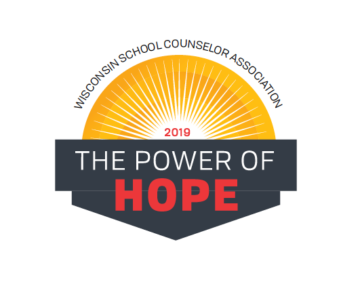 Monona Terrace Community & Convention Center
Monona Terrace Community & Convention Center
Madison, Wisconsin
The 2019 conference will bring you three days of dynamic professional development and will feature two fantastic keynote speakers:
Kevin J. Fleming, Ph.D. Producer of the viral animation video “Success in the New Economy,” and author of the bestseller, “(Re)Defining the Goal”.
Karen Gannon Griffith, Ph.D., LPC, elementary teacher, special education teacher, and a professional school counselor.
Want to be more than just an attendee at the WSCA Conference? Consider sharing your expertise on a hot topic in school counseling by presenting a preconference workshop or hour-long sectional. WSCA Coordinators are currently seeking applicants for the following presentation sessions:
- The call for 2019 Preconference Workshop Speakers is underway. We invite you to share your expertise with other counselors! Tell them about the unique programs developed in your school district. The purpose of the conference is to provide new challenges for professional and personal growth. The Preconference Program Proposal forms can be found HERE. Please note the June 1, 2018 deadline.
- The Search for 2019 Sectional Presenters is on! The heart of all WSCA Conferences will always be the sharing of material from school counselors in the trenches. Share your latest and greatest practices and ideas at the 2019 WSCA Conference by doing a one-hour sectional. Sectional Proposal Forms are now available and can be found HERE. The deadline for sectional proposals is November 10, 2018.
Criteria used for review and selection of program proposal will be based on timeliness of topic, interest in the topic, clarity of organization of the proposal form and geographic representation. Diverse and innovative programs are encouraged. Programs will be chosen that meet the needs of all levels of school counselors and other professionals and individuals interested in counseling.
Note: Presentations encouraging the purchase of books, materials or services will not be accepted.
Publications Committee Update
Are you interested in helping with WSCAlink?
Here are two ways to get involved:
- Submit an article! Anyone can write for our Tips for Best Practice section. Articles should be no more than 500 words and offer practical ideas that can be implemented right away. Past topics include a small-group that worked well, a great classroom management strategy, an enjoyable mindfulness technique, and more.
- Join the Editing Team! Do you have a penchant for pronouns? Do you leap for language? Do you delight in descriptions? If so, we would love for you to join the Publications Committee! Responsibilities include editing 2-3 WSCAlink issues per year. Contact us if you jump for jargon!
Send questions/articles to publications@wscaweb.org and then we will let you know when it will be used. Don’t be afraid, be published!
All submissions are due by the 15th of each month to publications@wscaweb.org
Upcoming topics and suggestions for articles include:
June: AODA Programs of Promise
- Supporting Students with AODA Concerns
- Partnerships with Community Organizations
July: Recharge Your Own Practice
- Tips for Self-Care
- Summer Reading Suggestions



